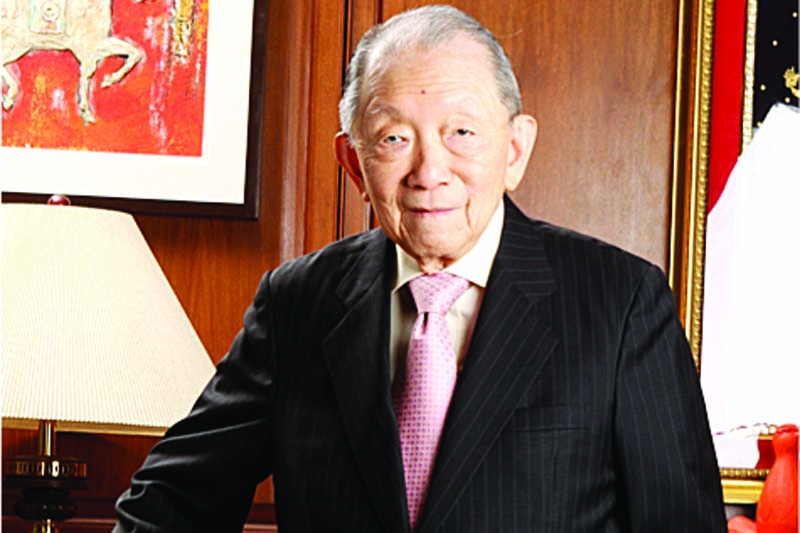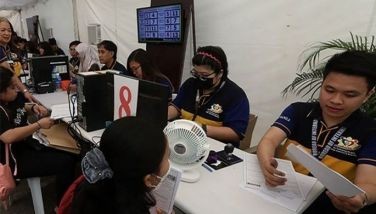Excerpts from ‘Wash: Only a Bookkeeper’
October 12, 2017 | 7:35am

WASH AT WAR:
Wash considered himself physically fit, enough to weather the arduous three-month basic training course. “My waistline was 28,” he remembers. He and his fellow trainees had to carry heavy packs and rifles and march the whole evening, putting one’s hand on the shoulder of the man ahead and trying to get some sleep in that position, before switching roles. They were up again early in the morning. But Wash never thought of quitting, fired up by the challenge of being part of the campaign to drive the enemy from his homeland. “At that point, the announcement was that the Japanese were moving ahead, and MacArthur promised that he was coming back. That was a lie, but at the time, we believed that the US would actually, at some point, rescue the Philippines. Of course, much later we would find out that their priority really was Europe.”
After boot camp in Camp Cooke, Wash was summoned for an interview. They told him he had the highest IQ in the regiment; the military believed he was overqualified for the infantry, and that he could be made better use of in intelligence work, so they were sending him to language school to learn Japanese. Wash knew that some people were also being sent there to learn Chinese, and suggested that he be shipped directly to where Chinese was required, as he already knew the language. But the military, having reasons that Wash was still unaware of, insisted on sending him to the language school in Denver for Japanese lessons.
After Japanese language school, Wash was sent to the cryptography school at Vint Hill Farms Station in Warrenton, Virginia. This station had been set up by the Army Signal Security Agency six months after Pearl Harbor to monitor and decode enemy communications and provide vital intelligence.
Here—in a bucolic environment known more for horses and fox hunting—Wash learned to chase after problems on paper. It was a task for which his intuitively analytical mind was well disposed, and, told to solve problems at their own pace, Wash was soon arriving at solutions ahead of the others.
.... Upon the arrival of his squadron in Bombay, Wash and his mates were given a briefing, where they were told that, as cryptographers, they were never to permit themselves to be flown over enemy territory. The Japanese were unaware of the Allied success in breaking their codes, and if a cryptographer were captured and should talk about what the Americans knew, the Japanese could switch codes, complicating and prolonging the war effort.
The cryptographers worked on transcripts of intercepted Japanese communication. There were no computers then, and they used IBM sorting machines that couldn’t break codes by themselves but could reduce the possibilities. The codebreakers began with a code chart with a thousand blanks, then worked their way to coherence, beginning with the knowledge, for example, that yesterday, five bombers had been sent to bomb a certain place; this was the specific information one looked for, the pattern by which other messages and meanings could be discerned.
.... And then, on August 15, 1945—what would be known as “V-J Day”—the war in the Pacific was over. The tens of thousands of Allied men and women who had fought in the China-Burma-India theater could now expect to go home—but not just yet. Wash and his unit remained in Calcutta, awaiting transport. They had no more work to do; they were debriefed, then told to forget everything they had learned. A week after those instructions were given, an article came out in the local newspaper breaking the story of the codebreaking operation, and the secret was out. Now the only thing left to do was to take a ship home.
WASH IN LOVE:
Wash was already an American citizen, but Williamsburg, Virginia—a town steeped in revolutionary history since the days of George Washington, who brought his army there, and Thomas Jefferson, who went to school at CWM—seemed hardly the place for this Filipino-Chinese lecturer, who was frankly worried about what he had heard about racial problems in the American South. “When I went to Williamsburg, the Rockefellers had not yet completed the restoration of the city, and there was only one cinema. They said that the place had 4,000 students, 4,000 regular residents, and 4,000 inmates in some kind of asylum.”
While on this visit, he had renewed his acquaintance with a childhood friend, Anna Yu, and they had fallen in love. The Yus were longtime friends of the SyCips, and both families had gone up to Baguio on vacations before the war. The Yu family owned one of the biggest Chinese businesses in Manila—Yutivo, Northern Motors, and Southern Motors— which imported and assembled American cars.
His brother David had started to court Anna’s sister Helen after the war, and Wash tagged along with his brother at first, visiting the Yus at their home near Mapa High School. Wash shortly began courting Anna as well. The socially shy and awkward Wash—“I didn’t even know how to dance,” he professes—doesn’t remember the romance of that courtship as much as he remembers Anna’s mother, “a very nice woman, a very good cook. She used to prepare Chinese dumplings and so forth.”
A very attractive young woman, Anna had been a popular student at the University of the Philippines, from where she graduated with a Humanities degree. In 1946, she too left for the US to take up summer courses at Wellesley College just west of Boston. Here, she met fellow Filipinos then studying at MIT, the likes of Larry Henares and Fred Borromeo. In the fall, Anna proceeded to Smith College in Northampton, Massachusetts.
Wash continued his courtship in the States, when he was at William and Mary and she at Smith. They corresponded—she writing him more than he writing her. Once, during the summer, he found himself in New York, and took the opportunity to board a train for Northampton. Wash’s frugality prevailed over the common urge to bring chocolates or flowers, but he took Anna to a place that served good clam chowder. That day trip would be his only time to visit Anna at Smith College, but Wash’s simple charm must have worked, because Anna would soon tell him that, despite her many other suitors, he was “the only one for me.”
BrandSpace Articles
<
>
Philstar
x
- Latest
- Trending
Trending
Latest
Trending
Latest
Recommended






























